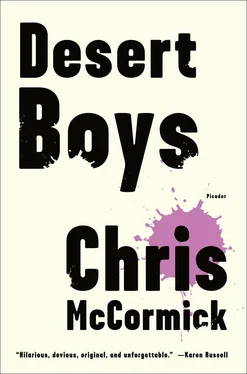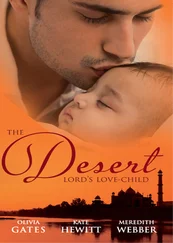“Jim, I think, is patrolling,” said Phil.
“That’s where he should be,” my uncle said. “Isn’t, though, as far as I can tell. Noise complaint from woman in number four-oh-three. Sarah. Says she thinks someone is messing around in the lot back there, with your buses. So I call Jim on the two-way, get nothing. Know what I do next?”
“No.”
“I get up. Out of bed. Tomorrow already, when I should be on my way home to Glendale, but how could anybody tell? Exactly why I let you keep buses out there, so I can sleep these hours and not be forced awake by noise in the lot. So I head out there to check it out, what do I see? Nothing. Nobody lurking — and no Jim Durant, that’s for sure. So I’m thinking, where the fuck is this guy? I spend twenty, twenty-five minutes driving around the park to find this man, the one I am letting live here for free, keep shit here for free. For the work he is not doing.”
“It’s not right,” Phil said. “What he’s done isn’t right, and for that I’m sorry.”
“You know I’m a good man,” Gaspar said. “I don’t give people shit for things. I let people be happy so long they’re not making me, my family, unhappy. Sometimes I have too much to drink, and for that I’m working on it. But I’m a fair, good man. I know that about myself, so I can get pissed off once in a while.”
“No, you are, I agree. Let me cover his shift tonight and we’ll figure out why he dropped the ball tomorrow morning. How about that?”
My uncle considered it. He removed the big white jacket and placed it on some newspapers spread over the kitchen table. “Wear it when you go out,” he said, heading to the door. “I saw you on patrol last night, no jacket. You’ll get sick.”
* * *
Secretly Phil had a better answer to the question, What is it that you do? He imagined telling it to people who had asked him before, and hoped to tell a person who’d ask him in the future. He’d say: I do what we all do, which is we gain or we lose momentum. He’d say, We’ve only got the verb “to do” because we’ve got the verb “to become.” The question, What do you do? inherently looked to the future: What will you become? What will become of you? As soon as the question was asked in the past tense, however, the meaning became, suddenly, an accusation: What did you do? What have you done?
A lot of what Phil had done in his life he did without knowing why, or caring, until after. Sometimes the answer was simple and easier to know beforehand. For instance: why Phil took the camera with him when he left the trailer was an easy one to understand, if not an easy one to explain later. It was as simple as this: He wanted to get rid of the camera. Holding a child’s camera made him sick. Before leaving, he deleted the picture he’d taken of himself, wishing he could erase more than just a photograph.
Aside from his clothes, all Phil took with him were the camera and the flashlight. And he wore Gaspar’s puffy white jacket. Didn’t even bother to lock his trailer or bring the key. That’s all he had on him: the camera, the light, and the jacket. None of them actually his, a thought that did more than cross his mind.
Nothing moved, nothing sounded. Phil passed the cars lining the pathways of the trailer park. Fog, inside, and frost on the outside clouded their windows. He half expected a kid to finger-draw a happy face in the fog from inside one of the cars. In front of Jim’s place, an empty space where his Chevy should have been. Phil skipped the layers he usually worked through to get to the park’s perimeter and headed straight to the gravel lot, figuring that Jim would be there, and the girls, too, if they’d made it out that night.
But when Phil arrived, he didn’t see anybody. The six buses glowed in that orange light, and that was about all there was to find. Jim kept the keys to the gate on his patrol nights, so Phil could only peer at the buses through the locked fence. He stood on the sidewalk along Avenue I, just before Twentieth Street East, exactly where the girls had stopped that first time. He took out the red camera and placed it in the gutter along the curb there. He debated leaving it. Maybe he’d keep it until the next time the girls stopped by. Maybe he could keep it for himself, but what pictures did he have to take, and what good is a digital camera without a computer? The thought of selling it crossed his mind, but not seriously. The truth was that it didn’t matter what he did with the camera, because before he could make up his mind, a gunshot went off somewhere to the east, away from town, out in the desert. And another.
Phil didn’t run away. Later he explained that he felt as though he were literally stuck in place. All he could do was remove the flashlight from his pocket, let it hang at his side toward the gutter, and flip the switch. On and off, on and off. A spot of light on the cement, unsteady, and then gone, and then there again. He had on his mind at that moment two things: first, a number, and then a name. The number 165—decibels — occurred and reoccured to him. Then came the name: “dolma”—he’d remembered the name of the food Gaspar’s sister made for him when he’d first moved into the park as a teenager, alone at seventeen. She removed the stems from grape leaves, and then boiled the leaves and rice separately. In a large bowl, she used her hands to mix the rice and the tomatoes and the lemon juice she squeezed in there, careful to pluck out any seeds that might have crept in. She said that in Armenia, she had her own grapevines and her own lemon tree, and the taste — you couldn’t imagine the taste of a real grape leaf, the strange sweetness of an Armenian lemon. Then she filled the grape leaves, spread across a cutting board now, with the stuffing she’d created in the bowl — you can use meat, she said while she did it, you can use lamb or you can use beef, but why not spare a life? She poured salt into the center of her palm and spread it over the rice on the leaves just before rolling them perfectly into little green tubes. You could see her fingers shine there with the juices and the oils of the dolmas, but it didn’t seem to bother her. She was a beautiful woman. Once, she’d been — plucking lemons from a branch — a beautiful girl, and Phil felt for her and for all of them.
* * *
Since that first time I heard the story, I knew what my curious but informal research would later prove to be true, which was that the gunshots meant the end of the two girls. For months afterwards, however, when I retold the story to people I wanted to count as friends, people I thought I could impress with a certain proximity to tragedy (here I’m not proud of myself), I was shocked to find that most felt unsatisfied by story’s end. The sound of two gunshots, apparently, couldn’t convince anyone that the two girls were killed. People wanted a clearer picture of the scene. They wanted to see the girls struggling to survive, fighting over the Marlin rifle in the cramped cab of the truck, which must have felt — someone once told me in a kind of prodding voice—“like a kind of coffin, no?” People expressed cautious, politically ambiguous doubt regarding two girls willing to leave home at midnight to meet a strange man. They would never blame the victims, they were quick to point out, but wouldn’t it also be likely that girls like these seemed willing — eager, even — to have sex? What else had they gone that night to find? Which precise sequence of events, these people wanted to know, had the power to transform Jim Durant — a creep, to be sure — into a killer?
These cravings for gruesome variations on a story surprised and saddened me, and then stopped surprising me and only saddened me, at which point, I stopped telling the story altogether.
Читать дальше












